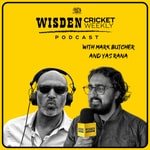Oborne & Heller on Cricket – Details, episodes & analysis
Podcast details
Technical and general information from the podcast's RSS feed.

Oborne & Heller on Cricket
Peter Oborne, Richard Heller
Frequency: 1 episode/10d. Total Eps: 118

Recent rankings
Latest chart positions across Apple Podcasts and Spotify rankings.
Apple Podcasts
🇨🇦 Canada - cricket
31/07/2025#99🇨🇦 Canada - cricket
30/07/2025#99🇬🇧 Great Britain - cricket
30/07/2025#96🇨🇦 Canada - cricket
29/07/2025#98🇨🇦 Canada - cricket
28/07/2025#98🇨🇦 Canada - cricket
27/07/2025#98🇨🇦 Canada - cricket
26/07/2025#98🇨🇦 Canada - cricket
25/07/2025#97🇬🇧 Great Britain - cricket
25/07/2025#89🇨🇦 Canada - cricket
24/07/2025#97
Spotify
No recent rankings available
Shared links between episodes and podcasts
Links found in episode descriptions and other podcasts that share them.
See allRSS feed quality and score
Technical evaluation of the podcast's RSS feed quality and structure.
See allScore global : 62%
Publication history
Monthly episode publishing history over the past years.
World Cricket And All That Shapes It Covered By Wisden Editor Lawrence Booth
Season 1 · Episode 118
mercredi 3 mai 2023 • Duration 55:49
Wisden Cricketers’ Almanack 2023 is the longest edition on record. It not only records the present state of global cricket but also reflects on the mighty global forces – political, social, commercial, environmental – which shape it. Its editor, Lawrence Booth, analyses its content as the guest of Peter Oborne and Richard Heller in their latest cricket-themed podcast.
Lawrence begins by hailing the turnaround in England’s Test team under Ben Stokes as captain and Brendon McCullum as coach. Although the England team dislike the term Bazball he thinks it a healthy sign that the general public have adopted it for the enthralling blend of cricket they are playing. The only pity is that they are not seeing it on free-to-air television (a topic regularly ventilated in previous Wisdens) but he still hopes that this summer’s Ashes series might raise the profile of cricket as did that of 2005. He comments especially on Ben Stokes’ confidence in asking for fast flat wickets in the Ashes series in contrast to the conditions in which England have gained all their home series successes since 2001.
Above all, Stokes and McCullum have removed the fear of failure from a previously careworn team. He suggests that Stokes’s character has deepened from the crises in his life: his empathy was illustrated by the consoling text he sent to the teenaged aspinner he had hit for 34 in an over. He views Brendon McCullum as the most significant cricketer of the last twenty years, given his innings which ignited the Indian Premier League on its first day and his contribution to the re-invention of Test cricket.
A major theme in this year’s Wisden is the multiple threat to Test cricket from T20 Leagues which have induced leading players in the world to reduce their commitments to international series or even abandon them. Lawrence believes that it is too late to reverse this process but he hopes that national boards might grow sufficient spine to halt the release of players to new T20 Leagues, particularly that proposed in Saudi Arabia, which would transform the international scene if it secures the best Indian players.
Lawrence comments pungently on the role of the International Cricket Council on three major topics covered in the Almanack: Afghan cricket since the Taliban takeover, cricket in Ukraine and the sponsorship deal with Aramco. The ICC has developed a habit of ducking fundamental decisions about the governance of the game and most of the full members are in permanent thrall to the financial and political power of India.
Continue reading here: https://chiswickcalendar.co.uk/episode-118-world-cricket-and-all-that-shapes-it-covered-by-wisden-editor-lawrence-booth/
Get in touch with us by emailing obornehellercricket@outlook.com, we would love to hear from you.
Sovereigns, stars, stewards, scorers, statisticians … Steven Lynch on this year’s Wisden obituaries
Season 1 · Episode 117
mardi 18 avril 2023 • Duration 54:18
Two monarchs lead the obituaries in the 2023 edition of Wisden Cricketers’ Almanack. As always, it is a melancholy but matchless memorial to global cricket’s losses, and a section to which many readers turn first. Its compiler and editor, Steven Lynch, discusses its selection and preparation as the guest of Peter Oborne and Richard Heller in their latest cricket-themed podcast. In this edition Roger Alton replaces Peter as co-host.
Steven outlines the late sovereign’s long connexions with cricket, understandably placed above the alphabetical list (“we could not file her under Q for Queen”.) He does the same for her great-great-grandmother Queen Victoria, reflecting the Almanack’s current policy of retrospective tributes to women omitted from Wisden, as she was in the 1902 edition.
The 195 following names ranged in age from a 16-year-old Indian schoolboy to a 102-year-old former umpire. Inevitably the number includes premature deaths from accident (such as Andrew Symonds and Rudi Koertzen) and suicide, but very broadly it suggests that cricket contributes to a long life.
The former cricketers are led by Shane Warne and Rodney Marsh, who died on the same day: Warne’s final tweet was a tribute to Marsh. Steven wrote Marsh’s himself: Warne’s was by his long-time collaborator Richard Hobson. Other contributors were Matthew Engel and Richard Whiting. Steven explains the general policy of not naming obituarists, to emphasize that the tribute of whatever length is Wisden’s final judgement on the subject. The object is always, especially in those less well-known, to bring out some unexpected detail of character and career (as with the player who had fielded out the whole of Hanif Mohammed’s innings of 499). Steven felt that Warne’s tribute had brought home his acute cricket brain and hoped that Marsh’s would counter his early stock image as a beer-drinking larrikin to suggest the thoughtful man behind it.
Steven also comments on:
Jim Parks of Sussex and England, first of a long line of Test batsmen-wicketkeepers, generously helped into that role by Keith Andrew;
Sonny Ramadhin, the great West Indian spin bowler, never the same after being made to bowl 98 overs against Peter May and Colin Cowdrey in 1957 with umpires who would not give him an lbw decision. He was the last survivor of the great West Indian touring team of 1950. Steven suggests that he and his partner Alf Valentine deserve a book to themselves;
the talented but troubled Andrew Symonds, who preferred fishing to off-field official events including team meetings and was embittered by the resolution of his dispute with the Indian Harbijan Singh;
the multi-gifted Andy Goram who played cricket as well as keeping goal for Scotland and annoyed a famous fast bowler by facing him without a helmet.
Continue reading here: https://chiswickcalendar.co.uk/episode-117-sovereigns-stars-stewards-scorers-statisticians-steven-lynch-on-this-years-wisden-obituaries/
Get in touch with us by emailing obornehellercricket@outlook.com, we would love to hear from you.
England versus Pakistan – the first seventy years with historian Najum Latif
Season 1 · Episode 108
mercredi 7 décembre 2022 • Duration 01:00:56
As England play their first Test series in Pakistan for nearly twenty years one of the country’s leading cricket historians, Najum Latif, describes their reception and celebrates the timely republication of a classic work on the start of England’s cricket relationship with the country. He is an expert tour guide to a vanished world as the guest of Peter Oborne and Richard Heller in their latest cricket-themed podcast.
Read the full description here: England versus Pakistan – the first seventy years with historian Najum Latif
Get in touch with us by emailing obornehellercricket@outlook.com, we would love to hear from you!
Talking with Sports Writer and Radio Broadcaster Pat Murphy
Season 1 · Episode 18
lundi 24 août 2020 • Duration 56:54
For well over forty years, as author, reporter and commentator with the highest standards of integrity, Pat Murphy has been telling the world about cricket as it really happened. He is the guest of Peter Oborne and Richard Heller in their latest cricket-themed podcast.
He sets out his ideals as a radio commentator, above all, being authentic, the same person off air as on it – like Terry Wogan. He adds: “you’ve got the best seat in the house, bring people alongside you.” The paramount need is to tell the score as soon as it changes. He shares the wonderful experience of a private seminar with John Arlott over 1 ½ days. He cites Arlott’s special gift for bringing in the crowd, one shared with other great commentators, in football and other sports, and how the current lack of crowds is a handicap to sports coverage. He hails Test Match Special in the 1970s as the apogee of cricket commentary, but notes how commentary styles have to change to meet public demand.
He reveals his favourite commentary bloopers – including the one which earned him after 45 years his first mention in Private Eye’s feature Commentator balls.
As a ghost writer and collaborator with such greats as Ian Botham, Viv Richards and Imran Khan, he shares the secrets of getting sports personalities to speak in their own voice and be open about issues which present-day readers expect to be discussed. He reveals which great cricketer could remember less about his on-field achievements than his celebration of them afterwards. He apologizes for some terrible punning titles of his books.
Pat Murphy dwells on his collaboration with “Tiger” Smith, Warwickshire and England wicketkeeper, then umpire and coach, whose long life covered a huge span of cricket history: he played with W G Grace and gave expert advice to Mike Brearley, then England captain, in 1979.
He reveals the astonishing pace (5000 words a day) at which he produced his recent detailed and multi-layered analysis of Warwickshire’s triumphs in the mid-1990s and the discipline he set himself to achieve this (including shaving before writing).
He shares his withering contempt for Rupert Murdoch and his impact on British sport and public life.
Offered the post of dictator of British sport he sets out a personal agenda for English cricket:
-Abolish the Hundred (an “atrocity”)
-End the dominance of marketing people at the English Cricket Board, and prevent them reducing and downgrading the County Championship
-Combat the marginalization of cricket in English life and declining participation thanks to the Sky paywall
-Stop cricket becoming a sport only for white children who have been to independent schools (just three black England cricketers so far this century)
Talking with Lord Jeffrey Archer
Season 1 · Episode 17
lundi 27 juillet 2020 • Duration 44:26
An ebullient Jeffrey Archer shares his lifelong passion for cricket as the latest guest of Peter Oborne and Richard Heller on their regular cricket-themed podcast.
He describes his earliest memories of watching his beloved English county Somerset at the Clarence Park ground in Weston-super-Mare (sadly no longer used for first-class matches). As a boy, he demonstrated entrepreneurial flair selling scorecards and especially teas: this inspired resistance from trade unions and helped to shape his political outlook as an opponent of the British Labour party.
He gives vivid portraits of a host of cricketers he has befriended on and off the field, including:
-Derek Underwood (he took revenge on him through a charity auction for two consecutive dismissals in a match)
-Viv Richards (he sacrificed his wicket for him in a match at Taunton)
-Clive Lloyd (brilliantly catching his other friend Sunil Gavaskar in delayed amends for dropping him during the latter’s first great series in the West Indies). He also praises Clive Lloyd’s dedication to the cause of young people in Britain and the West Indies
He assesses Ian Botham, “a friend for over 50 years… the bravest swashbuckler I’ve ever encountered. Had he been born 20 years earlier, he would have won the VC in the war”. Having earned the CBE on retirement as a cricketer and a knighthood for his dedicated charity work, Botham now has a peerage for political reasons, but he will have a chance now to follow another friend and cricketing peer, Colin Cowdrey, as a frequent contributor to the House of Lords on sport and young people. (It leads him to a splendid story about Colin Cowdrey and Len Hutton.)
Jeffrey Archer highlights his strong relationship with India (23 visits) and his friendships with cricketers including Sunil Gavaskar, Rahul Dravid and VVS Laxman (“their long partnership at Kolkata was the greatest day in Test history”) – friendships which began when they became readers of his during their long stays overseas. He would be glad to make a first visit to Pakistan and to do what he can to promote the restoration of bilateral cricket links between it and India.
He explains why he has never put cricket into his novels (“200 million of my 300 million readers do not understand it”) but looks forward eagerly to the cricket match in the televised version of his friend Vikram Seth’s great novel A Suitable Boy, which has just opened on BBC.
Turning to art, he reveals his expert knowledge of how to pack a Caravaggio. Sadly, it is not one of his own, but he reveals his latest acquisition for his lavatory and how to get to it (“turn right at the Picasso.”)
Cricket plays an important part in his three diaries of prison life. He describes encounters with murderers and serious villains who behaved very ethically on the cricket field.
At last he gives his account of the terrible events following his run-out for the House of Lords against the House of Commons – when he had to placate a crowd of 60,000 at the Oval, baying their disappointment at being deprived of the chance to see him score a fifty.
Finally, he reveals his programme if offered the post of Prime Minister in a government of national salvation (he is still available for this, and as captain of England’s cricket team). No one would be allowed to build anything on land used for cricket or any other sport. Above all, “every child will get a chance to have a chance” to fulfil their dreams and become the best they can be.
Talking with Pakistan Cricket Board Chairman Ehsan Mani
Season 1 · Episode 16
lundi 20 juillet 2020 • Duration 01:04:55
Ehsan Mani, chairman of the Pakistan Cricket Board – on Pakistan’s tour of England, on making cricket grow worldwide, on Pakistan v India, on Imran Khan – and the future Lord Botham
Ehsan Mani, chairman of the Pakistan Cricket Board since 2018, is the most experienced and high-achieving cricket administrator in the world. Apart from his present post, he served on the International Cricket Council from 1996 to 2006 and played a leading role in the transformation of world cricket.
Anticipating Pakistan’s series of three Test Matches and three T20s, he predicts that an exciting team will adapt to the bio-secure conditions (many have experience of playing in almost empty stadiums in the UAE). He picks out three talents he expects to shine.
He describes his dramatic appointment by Imran Khan (by telephone and Twitter) to his present post, and explains how Pakistan cricket is governed – and how much influence Imran exercises over it as Prime Minister and Patron. He outlines his own plans to reform Pakistan’s first-class structure, decentralize power and responsibility, and multiply opportunities and support for young players. He shows how he and the PCB cope with a litigious cricket environment, where almost any aggrieved party can find a court to launch a “public interest action” against them. (His estimate is that there are 24 current cases against the PCB.)
He gives an account of the PCB’s efforts to overcome politics and resume bilateral cricket relations with India. He shares his hopes for more international visitors to Pakistan after COVID, in the greatly improved security situation and after highly successful tours from Sri Lanka, Bangladesh and the MCC, led by Kumar Sangakkara, a victim of the attack in Lahore in 2009. Pakistan is eager not only for an early England team visit but for tours from schools, colleges and private groups, and for English players to join Pakistan’s new first-class teams.
Looking back, he describes how he “stumbled” into cricket administration and his achievements as a negotiator for the ICC. These led to cricket’s “Big Bang” in the 2000s and generated immense new sums from the sale of media rights. These transformed the ICC from an obscure committee, whose members argued over expenditures of a few thousand pounds into a financial powerhouse for global cricket. He reveals how he pushed for a share of this money to grow cricket worldwide – and how the Chinese authorities were eager to make cricket take off in their country.
Earlier, he responds to the announcement of a peerage for Ian Botham (who made a infamous disparaging remark about Pakistan). “As a cricketer, he probably deserves it, one of the greatest all-rounders England has had. I don’t like cricket and politics coming together. I feel he’s been used a little bit, and been given a peerage for the wrong reasons.” Peter and Richard revive their proposal for a peerage for Michael Holding – and suggest a new cricketer to join him: Mike Brearley.
Talking with ICC Umpire Simon Taufel
Season 1 · Episode 15
lundi 13 juillet 2020 • Duration 55:19
Simon Taufel, for five years in a row the ICC’s Umpire of the Year and author of Finding The Gaps, is the latest guest of Peter Oborne and Richard Heller in their regular cricket podcast, joining them from Don Bradman’s home town of Bowral, NSW, Australia.
His book Finding the Gaps can be found here: bookdepository.com/author/Simon-James-Taufel
He offers unique personal insight into the role of modern umpires and match officials at the highest levels of cricket. They have become a “third team”, with responsibilities much wider than interpreting the Laws and match conditions, which makes it possible for the two playing teams to perform. He describes his intense drive for continual improved performance, and the lessons it offers for other walks of life.
Injury and chance turned him to an umpiring career at an unusually early age. When he umpired his first Test match (Australia v West Indies December 2000) he was younger than 12 of the players in both teams – an unusual world record which is likely to last, in spite of the trend for younger umpires. He contrasts the minimal pre-match preparations and later feedback for officials at that Test with those of the present day.
He comments wryly that umpires are remembered for the 5 per cent or fewer of decisions they get wrong rather than the 95 per cent or more they get right. He gives an example of each. He describes vividly his feelings over mistakes (like grief at a bereavement) and how he tried to move on and learn from them.
In a warm tribute to David Shepherd, with some delightful stories, he emphasizes the importance of partnerships and teamwork between umpires and other officials.
Simon Taufel describes his terrifying experience as a victim of the attack on the Sri Lankan cricketers in Lahore in 2009. Movingly, he describes the annual commemoration he holds with other survivors, as well as his feelings on a recent return to Pakistan.
Finally, from all his experience as a top-level umpire, he says which of the Laws of cricket he would like to eliminate.
Apart from their conversation with Simon Taufel, Peter and Richard react to Michael Holding’s powerful and eloquent statements on BlackLivesMatter and the impact of racism.
They suggest that he might follow Learie Constantine into the House of Lords, as Lord Holding of the Oval.
Talking with Cricket Historian Stephen Chalke
Season 1 · Episode 14
vendredi 3 juillet 2020 • Duration 42:51
Stephen Chalke has given deep personal service to the oral history of English cricket, weaving together the personal stories of cricketers past into a unique social tapestry of the game. His publishing house, Fairfield Books, published 42 titles, 19 by himself, of cricket books which might never have emerged from mainstream publishers. He did almost every job required himself, notably distribution and promotion, and his time and labour earned less reward per hour than the minimum wage. In retirement from Fairfield, he continues to help publish narratives of cricket.
Stephen Chalke describes with deep feeling his collaboration with his subjects. Often he spent week after week with them, teasing out their memories and letting them find their voice. Recounting stories of Ken Taylor, Mickey Stewart, Fred Rumsey, Bob Appleyard & more.
Talking with West Indian Commentator Fazeer Mohammed
Season 1 · Episode 13
vendredi 26 juin 2020 • Duration 53:56
Fazeer Mohammed has been delighting global audiences since 1987 as a cricket commentator combining ebullience, eloquence and erudition. In anticipating the coming West Indies series, he comments powerfully on support for the BlackLivesMatter agenda not just from the team but among all the people and nations of the West Indies.
He analyses acutely the recent weakness of West Indies in traditional cricket in contrast to their resurgence in T20, and the deep-seated social and structural factors behind it. Offered the role of supreme dictator of West Indies cricket, he offers a set of remedies in 90 seconds.
Above all, he speaks with passion and insight about the art of cricket commentary, especially on radio: for the commentator, it means being a guest in someone’s home and he describes the standards he sets himself for this role.
Talking with Mickey Arthur, Sri Lanka’s National Coach
Season 1 · Episode 12
vendredi 19 juin 2020 • Duration 45:23
Mickey Arthur has been Sri Lanka’s national coach since February this year. He has resumed his work there with the players after a strict lockdown. Before Sri Lanka, he coached three other national sides – his native South Africa, Australia, and Pakistan. This represents a world record which will take a long time to equal.





